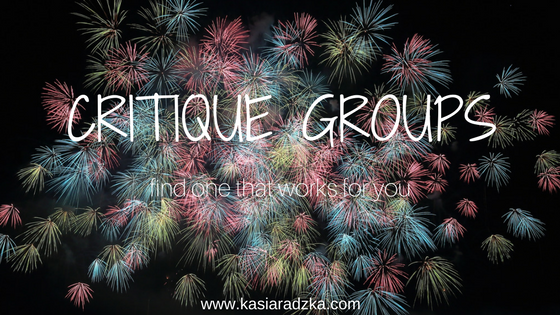
by Kasia | Jun 15, 2017 | Writing
A critique group.
My first thought was, “Hell yeah, let’s do it.”
Then my other half of the brain caught up and said, “What the fuck are you thinking?”
Critique groups aren’t for everyone. Before joining one, I heard rumours.
Some were full of praise. Others warned me off them.
Did I really want someone with about the same experience as I to tell me how I should write my story?

Now, I’m all for editors and beta readers. They are necessary to produce a good quality novel. No argument there. You need them no matter how wonderful your prose is because guaranteed, a reader will find an error.
But a critique group comes long before you read editor and beta reader stage.
Fellow members of your group are likely to see your raw material. Material that hasn’t had the luxury of editing and proofreading.
And that’s dangerous.
Especially, if you’re one of those individuals who take everything to heart.
You know, that as a writer you’re not going to please everyone. You might get raving reviews, and you might even encounter the nasty and vicious ones.
They will make you feel like shit.
It’s ok. Acknowledge them and move on.
Better yet, don’t read them.
Reviews are a waste of your time and energy. They’re subjective.
Check out your favourite authors, bestselling authors, award winners. I guarantee that you will find a malicious review.
And that’s for an already edited, proofread and finished product.
If you don’t want to ever get a bad review, save yourself the heartache, and don’t publish your writing.
FYI: Reading reviews is a waste of time, some will boost your ego, others will defeat it. But your book does need reviews to sell. Those reviews are for your potential readers, not you.
Your critique group isn’t going to see your best efforts. It’s going to see your first or second efforts. Drafts that still need to go through heavy editing and proofreading.
They are going to judge your raw writing, the bare bones of your story.
This has pros and cons.
You can get an idea whether your story is heading in the right direction. Or, you might be so influenced by the comments and suggestions that you lose your author voice.
While I haven’t been part of a critique group for long, I have found the following tips to be useful.
11 THINGS TO CONSIDER FOR A SUCCESSFUL CRITIQUE GROUP
- Mutual respect. You need to respect the members of the group and they have to respect you. The last thing you want is a group filled with vindictive personalities.
- Be willing to accept criticism. Everyone is entitled to their opinion. While I’ve grown up to believe that if you have nothing nice to say, don’t say anything at all. Unfortunately, when your critiquing or getting critiquing there are going to be things that you don’t want to hear.
- Always enter the critique session with an open mind and zero arguments. You’re not there to fight for your story. You are there to learn and to improve your writing
- So listen. Listen to the comments. Is there a pattern emerging? Are multiple people saying the same thing? Are there mixed opinions? You’ll find that both may occur.
- Take emotions out of the equation. Don’t get upset when someone doesn’t like a bit of dialogue or too much description. Nor should you jump for join when the group tells you that you’ve written a fabulous story. Stay level headed and take it all in.
- Decide what advice to use and which to discard. In the end, it’s your book, you have to enjoy writing it and you have to be happy with the finished product.
- The people in your group should enjoy a similar genre. No point in getting someone who only readers sci-fi thrillers to critique your historical romance.
- Use the sandwich approach when giving a critique. Compliment, critique, compliment. It’s much easier to handle a negative comment when there’s a positive one on either side.
- Set the ground rules for your critique group from the start. You want everyone to agree with the expectations set out for them.
- A critique group is a work in progress. It’s trial and error. You’ll find that with each session you’re going to come to a schedule and format that works for all members involved.
- Remember to have fun and enjoy the process.
Happy Writing!

by Kasia | Jun 14, 2017 | Writing
I love a good superhero movie. The good guys battle evil, they overcome a few obstacles, hit a dead-end, battle some more and end up coming out on top.
They’re fun, entertaining and playful.
Two hours of shutting off my brain and suspending all disbelief is a perfect way to relax.
So if anyone tells me that a superhero movie is (a) over the top, or (b) not realistic enough, I’m not going to be considerate with my language.
It’s a superhero movie, there’s nothing realistic about a caped crusader afraid of bats, or a boy shooting spider webs from his palms, a man flying around in tights and allergic to kryptonite, or a woman with bullet proof bracelets that’s lived for millennia, or a talking tree as sidekick to a racoon.
I do not go into a movie like that expecting realism. I expect fun and entertainment and shit getting blown up. The same as when I read a book.

Last weekend, I went to the cinema to see Wonder Woman. It’s a movie that needs to be seen on the big screen.
I had high expectations of Wonder Woman. Very high.
The media put out a lot of hype about the movie and how epic it was supposed to be. I have to admit, I was concerned that I’d be disappointed. And I did not want this movie to disappoint. I wanted to be impressed from start to the closing credits.
I’m happy to say that Wonder Woman surpassed my expectations.
It’s was probably one of the best, if not the best, superhero movies I’ve seen to date.
Wonder Woman is an origin story about Diana Prince, an Amazonian living on an island occupied only by women warriors who are trained to protect the world. They are beautiful, bright, and brutal when necessary. When the war literally knocks on their doorstep when Steve a WWI soldier crash lands his plane into the sea near the island, Diana, aka Wonder Woman, gets her call to action. She follows him into the world and we see her grow from an innocently naive woman to a confident, graceful and empathetic warrior, hell-bent on protecting the world from the God of War.
It made me laugh, smile, cry, and cheer for the good guy. In parts I felt the despair, fear and pain along with the characters.
Most importantly Wonder Woman was an empathetic and sympathetic character.
The kind of character that young woman today need to look up. Strong woman who strive for fairness, peace and integrity. Women who are capable of standing up to themselves whilst being graceful and kind, but also fierce when duty calls.
Emotion is a powerful element of creating powerful stories that resonate with readers (or viewers). The scenes that invoke the desired emotions can often be the hardest to write.
The more emotions we can invoke in our writing the more successful we will be.
Different genres will aim for different emotions but a little bit of humour to a serious moment in a suspense story can offer a breather and put your reader off guard so that when the next frightening moment appears it will seem more thrilling.
When you’re writing, what emotions do you want to invoke in your readers?
How can you convey the scene so that reader will feel what you’ve intended?
I’d like to give you a clear-cut answer to that but I just don’t know. Each story is different. Each writer is different.
But I do know one thing. You need to practice.
Practice with your scenes, your characters, your dialogue.
Show more, tell less.
The only emotion you’re going to invoke by telling is boredom and that’s the last thing you want to do when you’re writing for an audience. You’ll get to a point where you’ll even bore yourself. Then you know there’s definitely a problem.
I would love to one day create a character that is as emotionally engaging as Wonder Woman. With practice and perseverance, anything is possible.
Here’s a little exercise to get your creativity brewing and help you practice writing by focusing on showing instead of telling.
WRITING EXERCISE: SHOW, DON’T TELL
Write a scene portraying the following emotions and characters. Show don’t tell. Your reader wants a picture not a summary. 🙂
A happy child
A grieving widow
A love-sick teenager
The terrors of war
A relieved father
A revenge driven nun
A bored doctor
A wicked housewife
What would these people do? How would these people act? What could happen to turn the emotion to their polar opposite? Aim to write a scene that’s 100-500 words. See what develops. You might be surprised and meet a character perfect for your story.
Example
Beth stood by the kitchen bench, facing the window out to the neighbours backyard, her fingers tapping against the marble.
One. Two. Three. Four.
One. Two. Three. Four.
Outside, the toddler ran along the freshly mowed grass, falling over and leaving a green stain on his light khaki trousers. The woman scowled. Another pair meant for the trash. The man with the toddler just picked him up and threw him up in the air before catching him and squeezing him tight in a big hug. She saw them laugh, and the toddler was back on the ground chasing the soccer ball around.
Moving away from the window, she untied the apron from around her waist and hung it in its rightful spot inside the walk in pantry. She let her hand settle over her stomach for a few moments as she stood there wondering of what might have been.
But it was no use thinking back to the past so instead she looked at the pantry and grimaced at the sight. The sterile whiteness, bland and boring. Toaster, microwave, even the cans of tomatoes neatly stacked, each item with the designated spot that could not be altered.
She lingered a minute longer wondering how in the hell did she end up in that house spending her days slaving away in the kitchen, watching from a distance a life that could have been hers. At what point had she made the decision to be someone else? To forfeit her hopes and dreams.
But enough was enough.
Beth walked into the pantry, standing on her tiptoes she reached above to the back of the top shelve, pulling out a tiny vial hidden behind a packet of corn flakes, she smiled and allowed herself to daydream for just a moment about all the possibilites that were about to present themselves.
Now it’s your turn. Show don’t tell. Feel free to share in the comments.

by Kasia | Jun 13, 2017 | Writing
Perfection – it’s overrated. Often even paralysing.
It’s futile to your productivity and your progress.
Aiming for perfection stops us from finishings things. It stops us from putting out our ideas into the world to be enjoyed by others.
Creatives are often perfectionists.
If it’s not perfect, it often stays hidden in the depths of their documents or in notebooks stashed in the back of cupboards. Lonely, neglected and forgotten.
But perfection is subjective.
To us, a piece of work is never really going to be finished. It can always be improved, modifying, edited, tweaked.
Writers are often their worst self-critic.

It’s so easy to spend hours, days, weeks, even months editing a chapter aiming for perfection but never being happy with it. There comes a point where you have to say enough is enough.
Your work has to be good enough because ‘perfect’ is subjective and whilst one person might love it, another could hate it. Have you seen some of the reviews for the first Lee Child book? Even he can’t please every reader.
There comes a point where you have to be honest with yourself and make a decision to finish. Then to share it with the world. Then move on to the next project and never look back.
Just aim for each article, each blog post, each novel to be better than the one that came before it. Learn from your mistakes, improve your techniques, work on your weaknesses, highlight your strengths.
Perfection is an obstacle that prevents creatives from achieving their dreams. Quality is important but quantity is too.
It’s so hard to stand out in the world today that we as writers, authors, creatives, require a multitude of products on the market to be noticed and to make a living.
That’s not to say we put out crap without an ounce of editing, or create a cover design with zero designer skills. We hire professionals to help us with these things.
We write our best work. We self-edit. Proofread. Then hand it over to the pros.
Next, we proofread again.
Finally, we let go of our pride and joy, forget it, and start over with another idea.
You need to make a decision about your process, mould it to suit your schedule and your needs.
11 QUICK STEPS I USE TO GETTING THE NOVEL WRITTEN
1. Brainstorm your story.
2. Write the first draft.
3. Tweak the story line and subplots;
4. Make sure all the questions posed are answered.
5. Tie up any loose ends.
6. Proofread for grammar, spelling, and punctuation.
7. Hire an editor.
8. Hire a cover designer.
9. Get it formatted (or use Vellum).
10.Hit publish.
11. Start again.
An easy process. But you do need a process otherwise you end up going over and over your manuscript, never finishing. Never moving on.
We all need to move on. Move forwards and stop being stuck in one place regardless of what we are doing. It is the only way that we are going to grow into the writers we dream to be.
An essential aspect of creativity is not being afraid to fail.
– Dr. Edwin Land

by Kasia | Jun 12, 2017 | Writing
In the middle of the night, when I go walking in my sleep…
and so the song goes.
Anyway, night time and writers. What is it about the twilight hours when you’re lying in bed and moments of inspiration hit whilst you’re trying to get to sleep.
Then come morning time that inspiration has evaporated into nothingness. You’ve forgotten everything because (a) you were semi-conscious, and (b) you lied to yourself about being able to remember the gem of an idea in the morning.
Solution?
Keep a notepad and pen by your bedside. Or if you prefer just open the notes section of your phone.
JUST WRITE THE THOUGHT/IDEA/STORY LINE/DIALOGUE DOWN!
Because, yes, you are going to forget it once the alarm starts ringing and you’re desperately searching for the snooze button so you can get that extra eight minutes of shut-eye.

I’ve noticed recently that when I watch a movie, read a book or skim through an article my brain starts spitting out little grains of ideas that could potentially become stories or subplots in my novels or articles for the blog. The reason for this is that by consuming other forms of media, news, and entertainment I’m feeling up the creativity well of my brain and sooner or later (hopefully sooner!) it’s going to overfill and spill over lots of cool concepts and ideas (I hope so anyway!).
My notebooks are overrun with ideas for different projects and I often lose track of where everything is. So now I’ve just created a Word file where I can store all the different little snippets of ideas that come to mind. It’s just one document with the ideas separated by a page break or ***
Yes, I still keep notebooks too.
Once my current projects are finished, I know that I’ll have a few grains of ideas that I’ll be able to develop into novel-sized stories.
So the moral of the story is, write shit down.
giphy.com/gifs/idea-apM9v0vujr5aE”>via GIPHY
The chief enemy of creativity is ‘good’ sense.
-Pablo Picasso
Feeling stuck for ideas? We all do sometimes. Whether it’s coming up with a brand new story idea, article angle or coming up with an original fighting scene, sometimes we are going to struggle.
There are a few things you can do to spark up the well and find an idea that will work for your story:
-
PLAY THE ‘WHAT IF’ GAME. WHAT IF CATS COULD TALK? WHAT IF ONLY ONE CONTINENT REMAINED ON EARTH? WHAT IF YOU WITNESSED A MURDER? WHAT IF THE GOVERNMENT WAS MANIPULATING THE PEOPLE IN YOUR TOWN? WHAT IF YOU WOKE UP AND IT WAS JUNE 1945?
-
LIST FIVE TO TEN OBSTACLES YOUR MAIN/SUPPORTING CHARACTER MUST OVERCOME.
-
THROW IN A CRYING BABY, A SHATTERING SECRET, A DEAD BIRD, AN AFTERNOON ATTACK, A LOST GIRL.
-
WHAT’S YOUR DEEPEST DARKEST FEAR? MAYBE YOUR CHARACTER CAN EXPERIENCE IT.
-
FREEWRITE ABOUT YOUR GOALS, DREAMS, AND AMBITIONS.
-
SEND YOUR CHARACTERS ON AN OVERSEAS TRIP. TROPICAL PARADISE OR WAR TORN CITY?
-
REMEMBER: WHO? WHAT? WHERE? WHEN? WHY? HOW?
-
QUESTION EVERYTHING YOU SEE AND HERE. ASK WHY? WHY NOT?
-
PLAY TOURIST IN YOUR HOME TOWN AND WRITE ABOUT IT.
-
CHANGE THE TOOLS YOU USE. TYPE, HANDWRITE, USE DIFFERENT NOTEBOOKS. COLOURED PENS. DICTATE.
-
IF ALL ELSE FAILS, TAKE A BREAK. GO FOR A RUN. MEDITATE. TRY A BOXING CLASS. READ A BOOK. DANCE LIKE NOBODY’S WATCHING. COOK A FEAST. THEN WRITE ABOUT IT.
-
ALWAYS CARRY A NOTEBOOK AND PEN. RELYING ON YOUR PHONE TO TAKE NOTES ALL THE TIME CAN BE DANGEROUS AND YOU DON’T KNOW WHEN OR WHERE YOUR NEXT BRILLIANT IDEA WILL STRIKE.
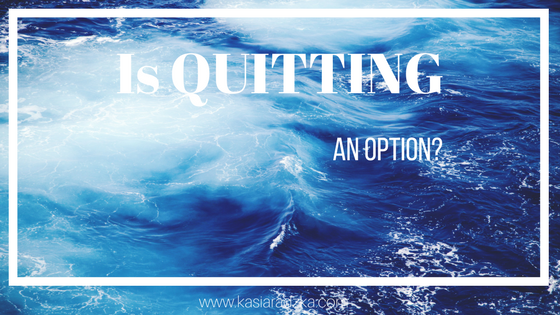
by Kasia | Jun 11, 2017 | Writing
Success. It’s a subjective concept.
What does success mean to you?
For me, it’s a lot of things but the epitome of success is:
(a) doing the things I love; and
(b) making a decent amount of money from those things.
Then I can say that I’m truly successful.
To date, I feel like I’m just treading water and getting nowhere. It sucks. It’s discouraging. I’m on the verge of succumbing to the rat race forever and forgetting about my dreams and aspirations.
I want to quit.
Quit my goals. Quit my dreams. Quit trying.
What’s the point when each day feels like I’m moving uphill with no end in sight?
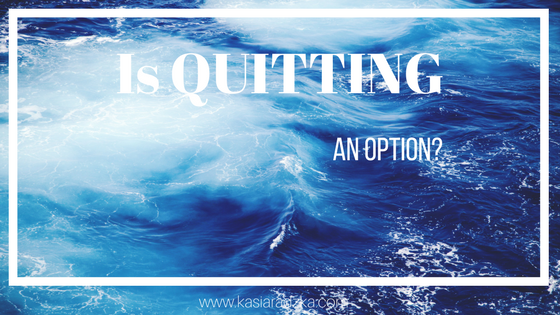
But quitting would be the easy thing to do.
It’s what the majority would do. Then they’d go around demoralizing other people’s dreams by telling them ‘this doesn’t work’ or ‘that’s impossible‘ or ‘there’s no way you stand a chance’ because they gave up before they had a chance to get a taste of success or they never bothered trying.
Yes, these people exist. The naysayers, the negative bunnies who just want to rain on your parade to make themselves feel better. Most will do it unintentionally, some will be sinister. Each one will leave their mark but it’s up to you how you react to the negativity.
You can listen. Or you can tread your own path.
What I like about hills is that at some point, sooner or later (hopefully sooner!) you’re going to reach its peak and the view is going to be spectacular. You’re going to reach the pinnacle and feel success running through your blood. Then, you’ll set another goal and climb another hill, another pinnacle and so forth.
Which is why quitting isn’t an option. At least not for me. Even though there are days like most of this week where I’m asking myself, “what the fuck is the point?”
The point is, it’s important to me.
What’s important to you?
What keeps you awake at night? What do you enjoy doing in your spare time? What lights up the fire inside of you? What do you want your life to look like? What are you willing to sacrifice to make it happen?
When you feel like quitting it’s time to take a step back. Reassess. Break down the big goals into small action steps.
Hit restart. Keep moving forward even if you first had to take two steps back.
You’ve hit a wall with that novel you’re writing? It sucks. It happens. Acknowledge it. Have a whine or (a wine!). Then,
- Read over what you’ve written. Is there anything you can add, expand, edit out? Are there any story lines that you haven’t developed? Questions you haven’t answered for the reader?
- Jump to another scene or chapter. No one said you had to write your novel in a coherent order.
- Do you know how you want your story to end? Write the last chapter. It doesn’t have to be permanent. You’ll be changing, modifying and fixing the story during the editing stage.
- Brainstorm some scene ideas that will show the themes you are trying to share with your readers. Don’t censor yourself. Have fun with it, write down whatever comes to mind regardless of how crazy or lame it sounds.
Doubts don’t just affect writers.
Most people will have thoughts of giving up – whether it’s whilst training for a marathon, studying for a degree, working towards a promotion, paying off debt, starting a business or saving for a house deposit.
The steps we need to take to achieve our ambitions aren’t always going to be easy.
Sometimes they are fucking hard.
But our perception of these hurdles is what can help us jump over them.
Often they are just testing our commitment, sometimes they are forcing us to reexamine what we are striving for, at other times pushing us to step outside our comfort zones and find alternative solutions.
Whatever it is you want to do, when the going gets tough, don’t quit. Push through. Today, the task at hand may seem daunting, but tomorrow that feeling will pass and you’ll be a step closer to achieving your goals, whatever they may be.

by Kasia | Apr 7, 2017 | Writing
It wouldn’t a stretch to suggest I’ve fallen off the face of the earth. I’ve neglected this little piece of internet real estate for far too long. I’ve got a list of excuses but I won’t bore you with them.
Quarter 1 has been stressful and full on. I’ve taken on more responsibility and commitments than I probably should. But these things happen. We move on.
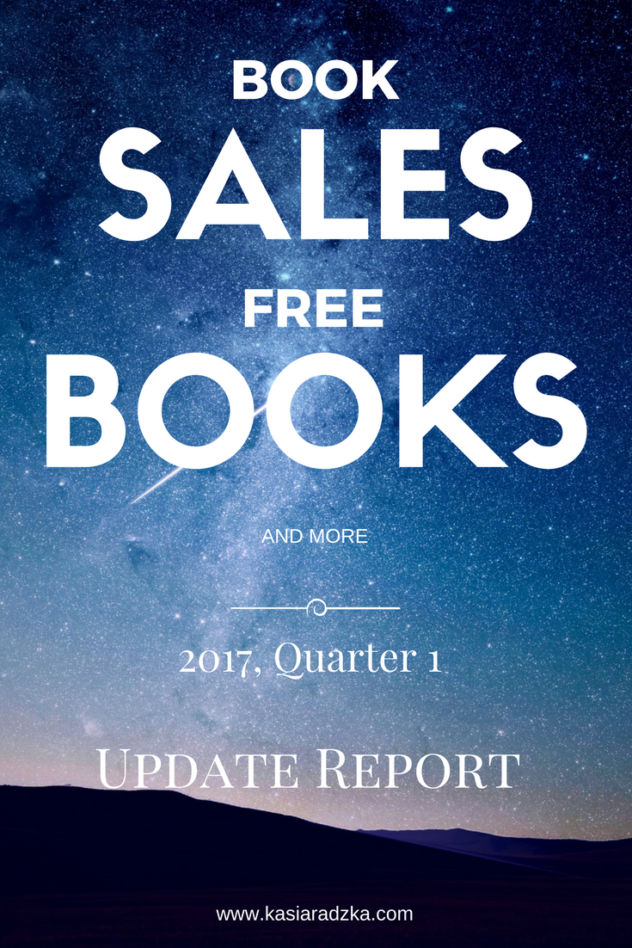
The upside: I’ve finished editing Book # 4 in the Lexi Ryder Crime Thriller Series.
The process has taken much longer than anticipated – lots of procrastinating in between!
It’s so easy to to over edit and ruin a story or never have it published. I’ve reached a point where enough is enough. It’s time to publish and move onto to the next project.
So, Lethal Games is heading to my proofreader and I’ll have the cover reveal and blurb out shortly.
Hooray!
BOOK SALES & GIVEAWAYS
The first book in the Lexi Ryder Crime Thriller Series is currently perma free on Amazon, Kobo & Smashwords.
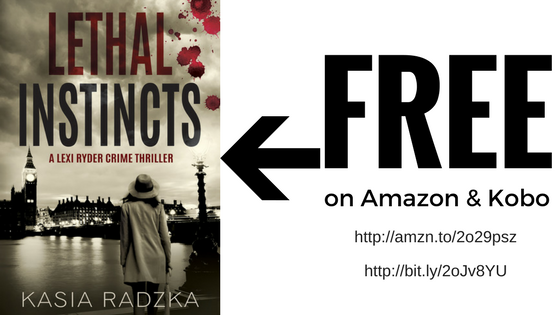
If you happen to download the book from Smashwords, I apologise but the formatting may be off. I’m in the process of reformatting all three books in the series.
The only marketing that I’ve done is some Twitter posting.
FREE BOOKS DOWNLOADED: 199
BOOK SOLD: 11

FREELANCING & SIDE HUSTLES
As much as I’d love to have time to hustle more and get freelance assignments, I just don’t have the time or the energy. Freelancing hasn’t been a priority.
That’s not to say that I’m giving up.
No, I enjoy writing articles and will submit queries and pitches. I’m just taking the pressure off having to do it. Which means I’m probably more likely to get shit done.
If you want to become a freelance writer, I highly recommend 30 Days or Less To Freelance Writing Success course. If you do everything the course instructs, you can start earning in the first 30 days of starting your freelance writing career. Check out this interview with Gina Horkey from Horkey Handbook for more info, So, You Want To Be A Freelance Writer or How To Become A Freelance Writer.
PITCHES SUBMITTED: 4
RESPONSES: 0
ON MY BOOKSHELF
I’ve set a goal to read 78 books this year. It’s been a slow start but here’s some of the books that I’ve enjoyed.
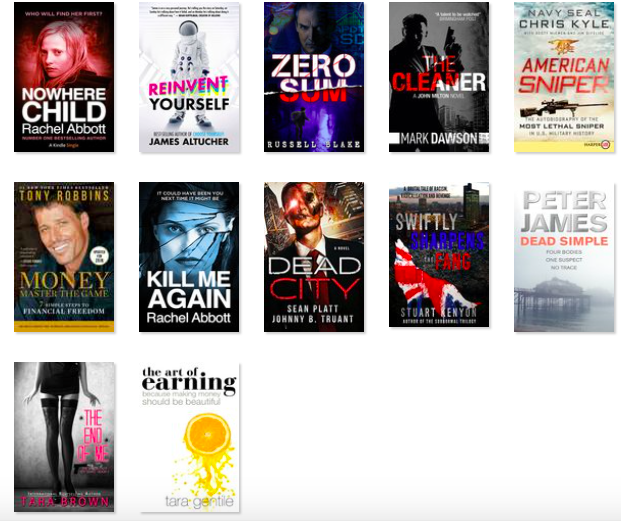
1. The Art of Earning: Because Making Money Should Be Beautiful
2. The End of Me by Tara Brown
3. Kill Me Again by Rachel Abbott
4. Dead City by Sean Platt & Johnny B. Truant
5. Dead Simple by Peter James
6. Swiftly Sharpens the Fang by Stuart Kenyon
7. American Sniper by Chris Kyle
8. Nowhere Child by Rachel Abbott
9. The Cleaner by Mark Dawson
10. Reinvent Yourself by James Altucher
11. Zero Sum by Russell Blake
12. Money Master The Game: 7 Simple Steps To Financial Freedom by Tony Robbins
Do you have Goodreads? We should connect.
CHANGES
I’m not happy with the look of this place. So over the next few months I’m going to have a redesign.
I want to share with you some awesome indie talent that’s out there and will start featuring indie authors and their books.
GOALS FOR QUARTER 2 (April – June)
1. Publish Lethal Games – Book 4 in the Lexi Ryder Crime Thriller Series
2. Reformat all three books and update on Amazon, Kobo, Nook, iBooks, Smashwords
3. Publish Omnibus – Book 1 – 4 in the Lexi Ryder Crime Thriller Series
4. Start marketing my books through Facebook, Amazon, Goodreads, etc.
5. Rebrand my website
6. Complete draft of my new series – a little horror, a little supernatural, a little forbidden romance.
7. Write and publish my first non-fiction ebook
8. Sell 100 books and giveaway 1000 books
9. Start a monthly newsletter
10. Create a schedule for writing and blogging and stick to it.
How is your year going? Are you meeting your goals for 2017? Have you read any interesting books lately?









